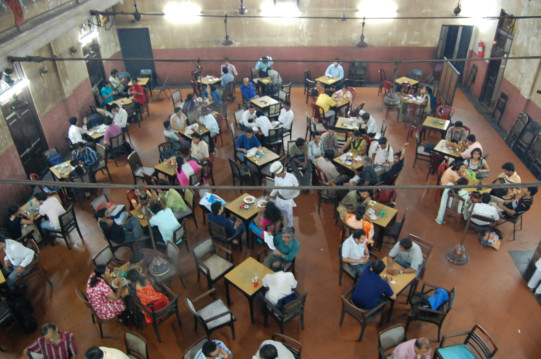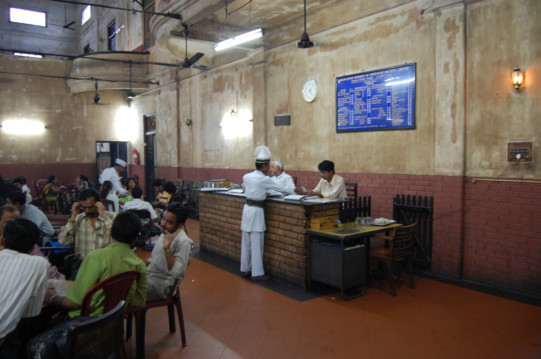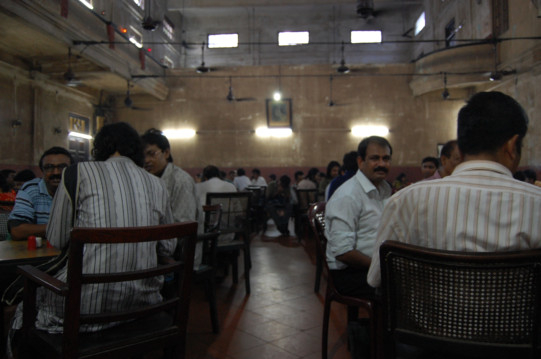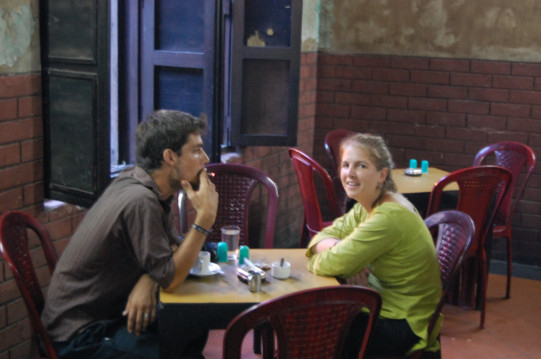
An unusual doorway flanked by a regular cigar shop, walls plastered with a myriad of political posters and graffiti, and then a dilapidated winding staircase leading to a hall filled with noise, smoke and nostalgia: Welcome to Albert Hall aka The Indian Coffee House on College Street! One walk through the street will tell you all about the city — its greatness, secrets — and allow you to hold its soul in the palm of your hand.
The legend of every grand metropolis is based on one iconic street. Fifth Avenue is New York’s brand ambassador, King’s way recalls the empire. Kolkata’s College Street recalls the city’s love for books and all that is culture, representing the city in good times; those days are firmly in the past and now the city is in stupendous metamorphosis. “Boi para” (colony for books), as the street is known in local parlance, is about 130 years old, was featured in the Time’s Best of Asia List of 2007 as the Best Literary Treasure Hunt. Thacker’s Directory of 1886 mentions about seven bookshops in the street. The earliest records of second-hand bookshops are found in P.M. Bagchi’s Bengali Directory of 1899. In short, it is a short street with a lineage, a metaphor of all that is so very Kolkata.
College Street has many claimants to its treasured history, but this old-world coffee shop is unique, a milestone in the cultural capital of India. It is a comforting continuum, equally associated with animated adolescence and the whole span of adulthood. Students, professors, businessmen, executives, lovers, tourists, politicians and celebrities — they all at sometime or other have stepped inside and come out soothed or moved.
Situated at the heart of Calcutta, opposite the Presidency College, the Indian Coffee House was commissioned in 1942 by The Indian Coffee Board to promote coffee in a city which was until then an excellent market for tea. The coffee house quickly developed on the lines of a student Literaten Kaffeehaus. The building, which even today is home to this institution, was originally the residence of Keshab Chandra Sen, who, almost three hundred years ago, worked with Rabindranath Tagore’s father Debendranath Tagore, to create the Brahmo Samaj. Later it was named after Lord Albert. During pre-independence, those part of the “Quit India” movement met here and Netaji Subhas Chandra Bose and Rabindranath Tagore were regulars. In 1994, the Supreme Court recognised the coffee house as a cultural centre of India.
This place, from where once revolutions started, is still charming. A cauldron of creative energy since its inception, this prestigious hangout has been and will be the ultimate pilgrimage to the budding poets, wandering philosophers, aspiring writers, struggling actors, directors, radical politicians and, of course, lovers. Personalities from all fields have graced this place. Even with seeping walls and tottering wooden chairs and tables, many important and trivial impromptu brainstorming sessions take place as people drink their coffee, read newspapers and savour the Chicken Afghani.
Elderly turbaned waiters in faded white uniforms and green cummerbunds drifting from table to table seem like an anachronism. The waiters are an integral part of this nostalgia and the very soul of this place. Their memory stores the names of the famous and the ordinary college-goers alike; from a memorable day that has gone down the pages of history to how many cups of “Infusion” (dark, strong coffee) and cutlets you have devoured, they keep track of it all. So, if you are a regular and have been too much on caffeine, be prepared to get some stern rebukes from these men in white, and if you are too loud the bell at the cashier’s is there to warn you!
Everyone knows about Kolkata’s love for “adda” (casual meeting with friends to discuss every possible issue and while away time) especially about exalted topics from Dostoyevsky to the caprices of Indian cricket. It usually involves some amount of talk about cricket, politics, football and food, and always with a footnote about the songs of Tagore. This talk permeates the coffee house, insulated from the noise of the street outside by its high vaulted ceilings and thick walls.
The menu is the legacy of the raj, boasting of items such as grilled chicken, roasted chicken, baked fish; and the prices are mostly less than a dollar (Dh3.67). A plate of sandwich will cost you around 50 cents while the prices of the Chinese items are on a higher side. Infusion — which is synonymous with this institution — is priced at around 25 cents. Climb up to the second, balcony floor, aka “house of the lords”, and look down at the packed main floor of the house. Groups, small ones to large ones and of all ages, are seated. A few two-somes; no, this is not the place for romance! Here the price of all things served is two rupees (14 fils) higher than in the main hall, “house of the commons”.
The ambience has changed a lot over the ages, and what stands now is a mere shadow of what the coffee house used to be in its heyday. Even though today’s trendy coffee parlours may have robbed this now derelict, but still popular, hangout of its sheen, they have not been able to match its intellectual aura. It still pulls in the eclectic crowd, backpackers, Bengali boudis (newly married women), young mums, IT professionals, who may be “programmed” for tomorrow but come here to get a taste of tradition.
This year The Indian Coffee House celebrates the 50th anniversary of its takeover by the Indian Coffee Workers’ Cooperative Society Ltd, which, ironically, has also been blamed for the lack of care for this place strewn with history. However, the society points out the general lackadaisical attitude to heritage. According to Subhash Ganguly, secretary to the cooperative society, “Since this place has always been a haven to people where one can indulge in prolonged ‘adda’ sessions, most of our clients are young college-goers who enjoy the liberty to sit here and chat all day over a few cups of coffee. Hence, although the place is packed every hour of the day, we are going through a severe financial crunch.”
A private builder though has recently offered to help in renovating the place even as the coffee house fans keep their fingers crossed. “We expect the renovation to start soon,” Ganguly said. “But, whenever it happens, we are strictly looking at a ‘renovation’ and not at changing the colour and the clamour of the place.”
The coffee house receives visitors from far and wide. Michael Kerr, who is from the United Kingdom, said, “I heard about the coffee house from my grandpa who was born in Kolkata. From then onwards, I was interested in visiting the place of my dreams.” In fact, many visitors to the city feel that the coffee house, if revamped, will definitely add to the academic charm of the College Street area. It will not only stand as one of the most revered heritage sites of the city, but also woo people from afar for a sip of coffee in an oasis of camaraderie.
Archisman Dinda is a journalist based in Kolkata.





